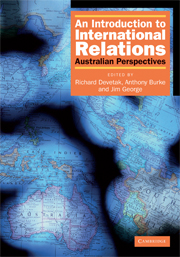Book contents
- Frontmatter
- Contents
- List of tables, figures and boxes
- List of contributors
- Preface and acknowledgments
- An introduction to international relations: the origins and changing agendas of a discipline
- 1 Theory and practice in Australian international relations: the search for identity and security
- Part 1 Theories of international relations
- Part 2 The traditional agenda: states, war and law
- 10 The modern state and its origins
- 11 Nationalism and war
- 12 Security
- 13 Arms control
- 14 The changing character of warfare
- 15 The ethics and laws of war
- 16 International law
- 17 International society and european expansion
- 18 Order and decolonisation in Southeast Asia
- 19 The cold war
- Part 3 The new agenda: globalisation and global governance
- Glossary of terms
- Bibliography
- Index
- References
12 - Security
from Part 2 - The traditional agenda: states, war and law
- Frontmatter
- Contents
- List of tables, figures and boxes
- List of contributors
- Preface and acknowledgments
- An introduction to international relations: the origins and changing agendas of a discipline
- 1 Theory and practice in Australian international relations: the search for identity and security
- Part 1 Theories of international relations
- Part 2 The traditional agenda: states, war and law
- 10 The modern state and its origins
- 11 Nationalism and war
- 12 Security
- 13 Arms control
- 14 The changing character of warfare
- 15 The ethics and laws of war
- 16 International law
- 17 International society and european expansion
- 18 Order and decolonisation in Southeast Asia
- 19 The cold war
- Part 3 The new agenda: globalisation and global governance
- Glossary of terms
- Bibliography
- Index
- References
Summary
Introduction
This chapter introduces the concept and practice of security in international relations. It explores various dilemmas of security faced by states, individuals and the global community, by first examining how security has been differently defined, and second by surveying how different theoretical approaches (realism, liberalism, constructivism, feminism and critical theory) have understood and analysed security.
Four crises
In October 1962 an American U-2 reconnaissance aircraft returned from a routine overflight of Cuba with photographs of Soviet personnel and machinery installing nuclear missiles aimed at the US – precipitating a crisis that almost led to global nuclear war (Blight and Lang 2005).
In July 1997 the government of Thailand floated its currency, the baht, on international markets after losing US$23 billion trying to defend its value from attack by traders. It lost 15 per cent of its value in one day, provoking a contagious effect across East Asia that resulted in widespread corporate bankruptcies, massive falls in economic growth and employment, the fall of governments, and protests, riots and civil violence that took thousands of lives (Robison et al 2000).
Two years later, in September 1999, the people of East Timor voted in a referendum on independence from Indonesia, only to fall victim to a campaign of murder and destruction by Indonesian-backed militias. After many days of carnage and intense international diplomacy, the UN Security Council authorised a military intervention led by Australia to stop the violence (McDonald et al 2002).
- Type
- Chapter
- Information
- An Introduction to International RelationsAustralian Perspectives, pp. 144 - 154Publisher: Cambridge University PressPrint publication year: 2007



